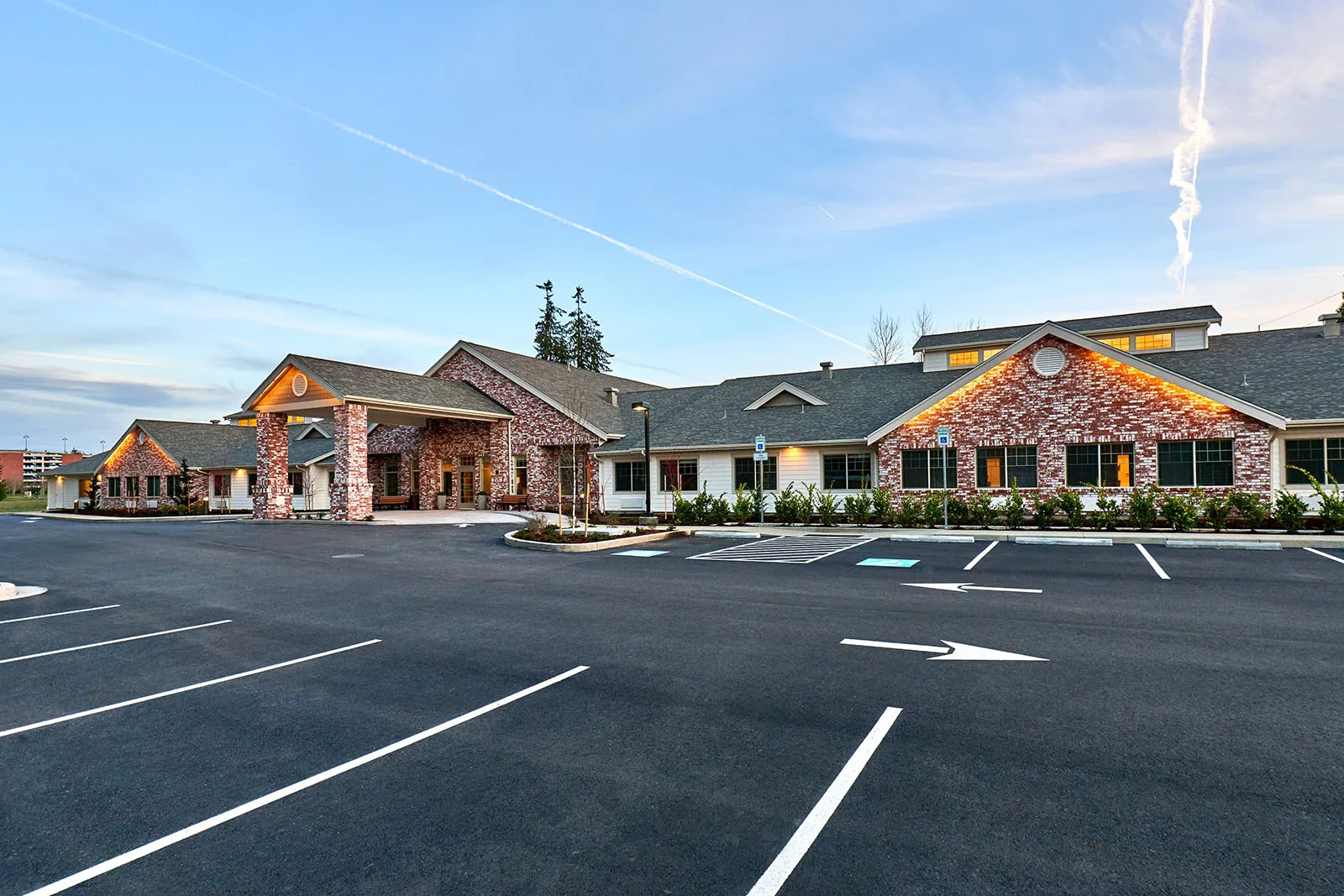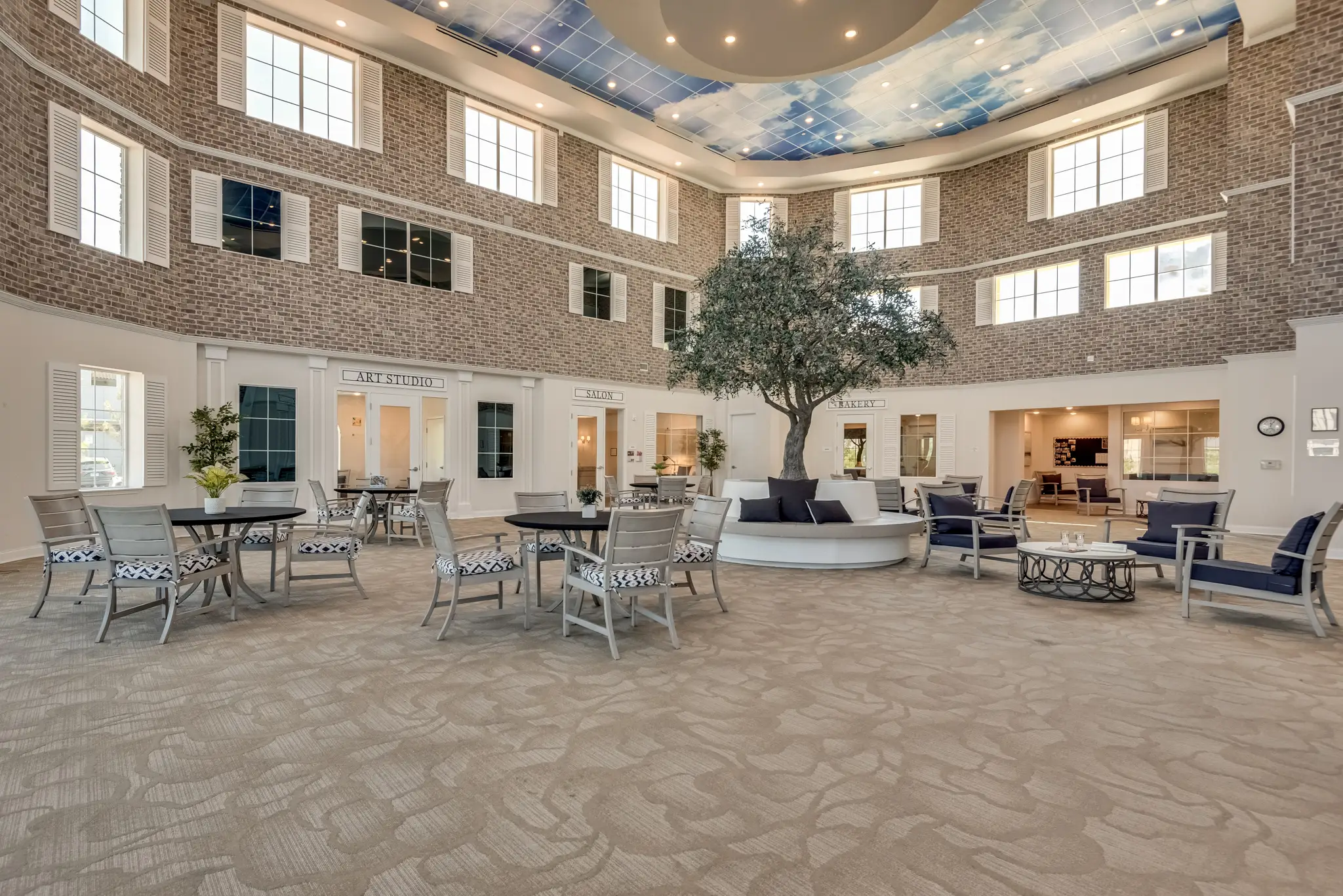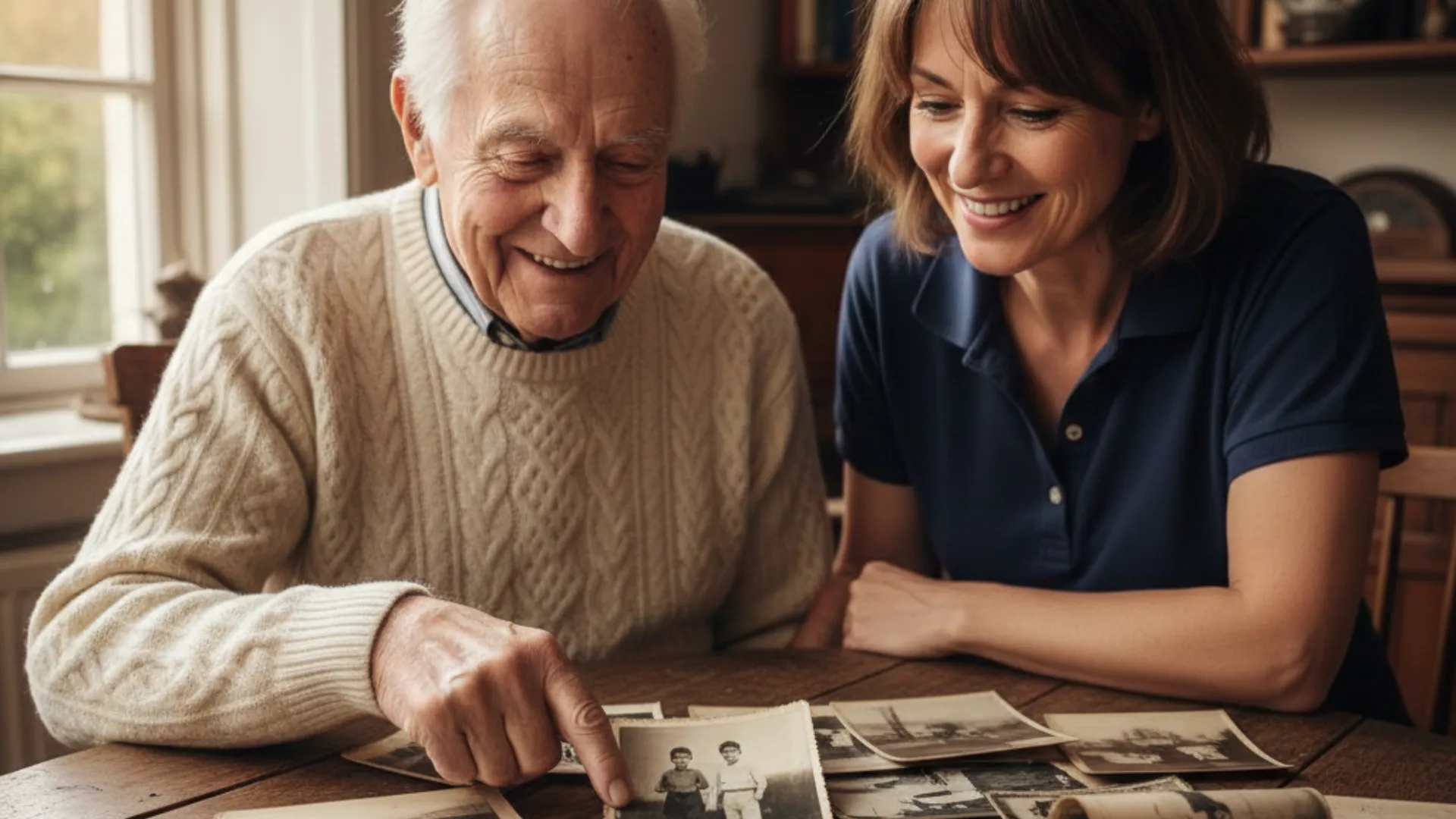50+ Activities for People with Dementia

Also see: 101 Things to Do With Someone With Dementia
Games, crafts, and outdoor activities can make your loved one feel valued and engaged. These activities can boost their mood and keep their minds active.
Finding rewarding activities for someone with dementia is challenging but crucial. Engagement is key in dementia care and can enhance your loved one’s quality of life. Family members who engage in activities with their loved ones support their sense of purpose and help them feel valued. In addition to building confidence and connection, activities like games and crafts give people with dementia a sense of accomplishment.
Choosing appropriate activities based on their dementia stage is critical. Early-stage dementia patients may enjoy more challenging activities, while those in middle or late stages may need simpler tasks.
A study in the journal Gerontologist found that:
- Mild dementia patients could handle complex arts and crafts and cognitive card games for about 30 minutes.
- Moderate dementia patients engaged well with music and entertainment activities for about 25 minutes.
- Severe dementia patients benefited from simple exercises and sensory activities for about 15 minutes.
These insights can guide you, but it's important to try different activities to see what your loved one enjoys.
Our memory care experts from ONELIFE have compiled a list of enjoyable activities for older adults. These activities are categorized to help you choose the best ones for your loved one at any time, ensuring they feel creative, stimulated, and involved.
5 Fun Games to Play Together
Games can provide cognitive stimulation, especially for those in the early stages of dementia. Activities like card games or jigsaw puzzles can lower the risk of Alzheimer’s disease, as found in a 2022 study in the journal Neurology. They’re simple activities, but they keep the brain active. These games also promote conversation between loved ones and their caregivers. Here are some to try:
- Alphabet Soup: Pick a topic like travel or food, and take turns writing related words that start with each letter of the alphabet.
- Block Tapping: Use blocks or dominoes to create a memory game based on sound. Tap the dominoes in a sequence and ask your loved one to copy the pattern, starting with simple two-tap sequences.
- Jigsaw Puzzles: Choose a beautiful picture puzzle to complete and possibly frame. Puzzles can improve memory and problem-solving skills, and they help prevent cognitive decline.
- Card Games: Simple card games like War, Go Fish, or Uno can be fun and easier to follow than complex games like poker or gin rummy. These games can also be played with grandkids for extra bonding time.
- Word Scrambles: Buy a book of word scrambles or create your own. Use specific words to start conversations. For example, if the word is "animal," discuss childhood pets.
Word games are particularly suitable for those in the early stages of dementia. Sometimes, people might resist playing because they feel pressured. In such cases, it’s helpful to reframe the activity. For instance, one caregiver asked a former college professor for help with a night class, which encouraged him to play idiom games tied to his sense of purpose.
6 Activities to Inspire Creativity
Crafting, coloring, and painting allow for self-expression and reminiscing, regardless of dementia stage. For those with moderate or severe dementia, we shift away from memory-reliant activities. This prevents feelings of failure and encourages creativity. Here are some enjoyable activities:
- Do Scrapbooking: Choose a theme like nature or travel, and have your loved one cut out related pictures from magazines. Paste them into a scrapbook, engaging them in conversation about the images. This activity promotes hand mobility and reminiscing.
- Paint a Picture: Prepare materials like thick paper, brushes, and watercolors. Suggest simple objects to paint, such as a tree or house. Discuss the colors and the painting process with your loved one, which can be relaxing and expressive.
- Create a Photo Album: Gather meaningful photos from different life stages and place them in an album. Discuss the images without correcting any inaccuracies in their memories. This activity can evoke pleasant memories and foster conversation.
- Draw a Family Tree: Work together to draw and map out your family. Ask open-ended questions about family members to encourage storytelling. Focus on positive memories and avoid pushing if your loved one becomes frustrated.
- Ask a “Beautiful Question”: Pose open-ended questions like “What is something you treasure in your home and why?” or “What is the most beautiful sound in the world?” These questions stimulate emotional memory and creativity, providing a shared discovery experience.
- Have a Sing-Along: Group singing can improve the quality of life, cognition, and well-being for people with dementia. Join virtual singing groups like the Alzheimer’s Association’s AlzheimHER’s chorus to enjoy music together, enhancing emotional connection and enjoyment
5 Physical Activities That Promote Health and Balance
Physical activity helps reduce blood pressure, lowers stress, and relieves anxiety and depression, all of which impact a person with dementia.
While your loved one may not have the same agility or balance as before, many activities can be adapted. For example, a former runner might enjoy walking with a caregiver, or a cycling enthusiast might benefit from a stationary bike. Light weightlifting and chair yoga can also help maintain strength and flexibility. Here are some more options for those who are less mobile:
- Scarf Dancing: This activity improves balance and gets your loved one moving. Encourage them to make big arm movements, like waving overhead, and toss scarves from different angles. Scarf dancing can be done standing, sitting, or even in bed.
- Dress-Up: Pretend you're going to a party or event, and lay out clothes for your loved one to choose from. This activity can challenge coordination and endurance. Have a chair ready in case they need to sit.
- Tai Chi: This gentle exercise can improve cognitive function in those with mild cognitive impairment. There are chair versions available if standing is difficult. Check out this tai chi video or this seated tai chi video.
- Balloon Batting: Blow up a balloon and bat it back and forth, trying to keep it in the air. This can be done sitting or standing.
- Step Dancing: Describe simple dance steps, like stepping forward and clapping hands, and put on music with a simple beat. Join in to make it more fun and motivating.
7 Outdoor Ventures That Can Boost Mood
Spending time outdoors can greatly benefit people with dementia. A study in the journal Dementia found that nature exposure positively affects mood. A review of 17 studies also showed that outdoor time in gardens helps reduce agitation in people with dementia.
Sunshine and nature are crucial for people with dementia, especially if they loved the outdoors. It’s also nurturing for caregivers. We suggest immersing in the environment and discussing sensory experiences.
Here are some enjoyable outdoor activities:
- Picnicking in the Backyard: Set up a simple picnic in the backyard, enjoying the fresh air and a change of scenery.
- Taking a Walk or a Gentle Hike: Explore local parks or nature trails at a comfortable pace, allowing your loved one to enjoy the surroundings.
- Planting Flowers: Engage in gardening by planting flowers together, which can be both relaxing and rewarding.
- Watering the Garden: Encourage your loved one to water the plants, providing a sense of purpose and connection to nature.
- Feeding Ducks or Birds: Visit a local pond to feed ducks or set up a bird feeder in the backyard to watch birds.
- Sitting on a Bench Near a Lake: Find a peaceful spot near a lake to sit, listen, and observe the natural environment.
- Collecting Shells at the Beach: Spend time at the beach collecting shells, enjoying the sensory experiences of sand and water.
7 Ways to Stimulate Their Senses
Sensory stimulation can improve memory and cognition, according to a 2021 review in the Journal of Alzheimer’s Disease. Connecting with a person with dementia through their senses is a direct channel. Simple activities like having them touch a soft corduroy jacket and talking about memories can be meaningful. Here are some sensory-stimulating activities:
- Arrange Flowers: Use vases and trimmed flower stems for easy selection. Sorting flowers is good for hand mobility. Discuss what they notice about the flowers and what kinds they like.
- Cook a Meal Together: Focus on meal prep tasks they can help with, like mashing potatoes or peeling vegetables. Engage their senses by having them add colorful fruits to a salad or make flavored water with fruits and herbs.
- Do Household Tasks: Simple chores like folding towels, setting napkins, or sorting books by color or height can be engaging. Break tasks into smaller steps if needed.
- Treat Them to a Spa Day: Create a calm environment with relaxing music and soft lighting. Give an aromatherapy hand massage or a manicure to provide a soothing experience.
- Try Some Pet Therapy: Interacting with a friendly dog can reduce symptoms of agitation and restlessness. Pet therapy offers social interaction and comfort.
- Brush Their Skin or Hair: Gently brush their hand or arm with a soft brush, like a nail or makeup brush. Ask how it feels and what it reminds them of, or lightly brush their hair for a comforting experience.
- Practice Deep Breathing: Have them get comfortable and take deep breaths, holding for a few seconds before exhaling. This activity can be calming and stress-reducing.
What to Do When an Activity Isn’t Working
If your loved one’s attention span is decreasing or frustration is increasing, it may be time to modify the activity. Here are some steps to try:
- Simplify the Activity: Break it down into easy, manageable tasks. Focus on one step at a time to avoid overwhelming them.
- Assist with Difficult Tasks: Help with more challenging parts. For example, if cooking, you do most of the work while they handle simpler tasks like stirring.
- Add Purpose: Give the activity meaning by turning it into a gift, like a card for someone special.
- Avoid Corrections: It’s okay if they aren’t doing it the “right” way, as long as they are engaged.
If these strategies don’t work and your loved one becomes tired or upset, it’s okay to pause the activity. You can always try again later or choose a different activity.
To provide more options, we have compiled a list of 50 additional simple activities that can help stimulate the mind, encourage social interaction, and bring joy to your loved one. These activities are designed to be simple, enjoyable, and adaptable to different stages of dementia.
Do something outside:
- Take a walk
- Plant flowers
- Water plants
- Feed the birds
- Rake leaves
- Go to the park
- Sit on a bench or a swing
- Watch dogs at a dog park
- Play catch or toss a ball
- Play horseshoes
- Visit a beach or forest preserve
- Sweep the porch or patio
- Set up a picnic on the lawn or in the backyard
- Sit on the porch and drink coffee, hot chocolate or lemonade
Do something inside:
- Listen to the person’s favorite music
- Look at family photo albums
- Prepare afternoon tea
- Watch a favorite sport on television
- Model with play dough
- Play checkers or dominos
- Name the presidents
- Look at photos in a photography book or magazine
- Identify states on a U.S. map
- Complete a puzzle together
- Read from one of their favorite books
- Watch a favorite movie or sitcom
- Watch a sporting event
- Ask the person about his or her childhood, siblings, school, pets or first car
- Read the newspaper together or read it to them
- Play a card game
Do something personal:
- Give the person a hand massage with lotion
- Brush his or her hair
- Give the person a manicure
- Take photos of the person and make a collage
- Encourage the person to talk more about subjects they enjoy
- Make a family tree posterboard
Do something in the kitchen:
- Bake cookies or bread
- Set the table
- Make the person's favorite lunch or snack
- Wash and dry dishes
- Put silverware away
Celebrate family holiday traditions:
- Listen to favorite holiday music
- Bake holiday desserts
- Color eggs
- Carve a pumpkin or make a pumpkin pie
- Decorate a tree
- Create holiday greeting cards
- Watch a favorite holiday movie
- Play a piano or guitar and sing holiday songs
Need more ideas? See our blog on 101 Things to Do With A Person With Dementia or 60 Games & Activities for Adults with Dementia
Conclusion
Caring for a loved one with dementia requires patience, understanding, and a variety of engaging activities to manage daily challenges. By incorporating creative, physical, and sensory-stimulating activities, you can enhance their quality of life and create meaningful moments together. At ONELIFE Senior Living, we offer comprehensive dementia care services designed to support both residents and their families. Our dedicated team is committed to providing personalized care and a stimulating environment. Contact us today to learn more about our communities and how we can assist you and your loved one. Contact us today to learn more about our communities and how we can support you and your loved one.
Explore ONELIFE Communities Across the Country
ONELIFE Senior Living is proud to serve families in multiple regions, offering exceptional care and support tailored to each resident’s needs. In Springfield, Oregon, The Esther at Riverbend Assisted Living provides personalized assisted living services, while The Rawlin at Riverbend Memory Care specializes in compassionate Alzheimer’s and dementia care. Families in Salem can find trusted support at Battle Creek Memory Care, and those in Beaverton benefit from the warm, secure environment at Waterhouse Ridge Memory Care.
For families in Nevada, Vineyard Henderson Memory Care offers expert dementia care in the heart of Henderson, while in California, The Reserve at Fountaingrove Memory Care provides high-quality memory support in Santa Rosa, and The Woodlake Senior Living serves Sacramento with a full spectrum of senior living options. In Cottage Grove, Oregon, Middlefield Oaks Senior Living combines independence and care, while in the Midwest, The Laurel at Vernon Hills Memory Care stands as a dedicated resource for families in Vernon Hills, Illinois. Finally, in Phoenix, Arizona, Shadow Mountain Memory Care delivers compassionate, all-inclusive memory care in a safe and engaging setting.
No matter which location you choose, every ONELIFE community is united by the same mission: providing exceptional care, meaningful activities, and a true sense of family for residents and loved ones.
FAQ: Activities for People with Dementia
What are the best simple activities for people with dementia at home?
Start with familiar, low-step tasks: folding towels, sorting buttons by color, watering plants, matching socks, looking through photo albums, listening to favorite music, or rolling soft clay. Keep sessions short and end on a success.
How do I adapt activities for early, middle, and late stages?
- Early: light puzzles, card games, cooking prep, walks, simple crafts.
- Middle: matching games, sing-alongs, chair exercises, sorting household items.
- Late: sensory boxes, hand massage with lotion, soft fabrics, aromatherapy, comfort music, and brief 1-to-1 moments.
Read more about Understanding the 7 Stages of Dementia
What calming activities help with sundowning or agitation?
Soft lighting, slow music, hand/foot massage, warm washcloth on hands, gentle stretching, and repetitive, rhythmic tasks (folding, winding yarn). Avoid complex instructions late in the day.
Are there safe outdoor activities?
Yes: supervised garden walks, bird-watching, watering plants, patio tea, blowing bubbles, or sitting with a lap blanket to feel sun and breeze. Use shaded areas, hydration, and a clear route.
Which activities work well for men with dementia?
Try “purposeful” tasks: organizing a small toolbox (no sharp items), sorting screws/bolts by size (large pieces), wiping down a table, sports photo books, classic car magazines, simple fishing-knot practice with rope.
What about activities for women with dementia?
Try familiar routines: folding laundry, arranging flowers (silk), easy bracelet stringing with large beads, recipe scrapbooks, or looking through family photos. (Any activity can be enjoyed by anyone—go by interests, not gender.)
What sensory activities are good for late-stage dementia?
Textured blankets, soft brushes for hands, scented lotion (lavender/vanilla if tolerated), weighted lap pad, calming soundscapes (rain, ocean), and familiar hymns or lullabies at low volume.
How long should activities last?
10–20 minutes is often ideal. Watch for cues: if attention fades or frustration rises, switch or pause. Several short sessions beat one long session.
Are there free or low-cost activity ideas?
Yes: print large-type word/shape matching, use household items for sorting, playlist old favorites on a free music app, borrow large-print books from the library, or make a “memory box” with household keepsakes.
How can I keep activities safe?
Use large, non-breakable items; avoid choking hazards; remove sharp tools; supervise outdoors; and keep walkways clear. If wandering is a risk, do activities inside a secured area.
How do I encourage participation on a “bad day”?
Offer two simple choices (“music or photos?”), model the first step, validate feelings, lower noise, and try again later with something even simpler.
Can grandchildren be included?
Absolutely. Have them read picture books, look through albums, water plants together, or roll soft dough. Keep instructions simple and celebrate small moments.
Memory Care in Phoenix, Salem, Springfield, Beaverton, Cottage Grove, San Jose, Vernon Hills and Henderson
Choosing the right memory care facility for your loved one is a crucial decision. By understanding what memory care entails and considering the factors that make a great memory care community, you can ensure your loved one receives the best possible care. At ONELIFE Senior Living, we are here to support you every step of the way.
ONELIFE Senior Living offers exceptional memory care facilities in various locations throughout the country, including:
Phoenix, Arizona
Shadow Mountain Memory Care
Salem, Oregon
Battle Creek Memory Care
Springfield, Oregon
The Rawlin at Riverbend Memory Care
Beaverton, Oregon
Waterhouse Ridge Memory Care
Cottage Grove, Oregon
Middlefield Oaks Senior Living
San Jose, California
Sonnet Hill Senior Living
Vernon Hills, Illinois
The Laurel at Vernon Hills Memory Care
Henderson, Nevada
Vineyard Henderson Memory Care
Our communities are dedicated to providing a supportive and enriching environment for residents with memory loss. With personalized care plans, engaging activities, and compassionate staff, we strive to make our memory care communities a place where residents feel at home. Contact us today to learn more about our memory care facilities, and let us help you find the perfect home for your loved one.
Contact us
learn more about our
community

More Articles & Resources
EXPLORE THE ONELIFE COMMUNITIES




















